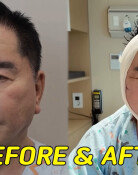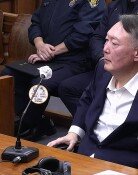Until when is Pres. Park going to embrace 3 key aides?
Until when is Pres. Park going to embrace 3 key aides?
Posted January. 17, 2015 07:28,
In the recent poll conducted by Gallup Korea for three days from Tuesday, only 35 percent of the respondents approved President Park Geun-hyes job performance, which was the lowest level since her inauguration. The rating has dropped by 5 percent after the New Years address on Monday. When asked about reasons, 19 percent cited the lack of communication and 13 percent responded the personnel management issue. Regarding the leaked document scandal, the president said, The allegation that a former presidential aide tried to exert undue influence on state affairs is totally groundless. Although she iterated there was no reason to replace "the three close secretaries who allegedly meddle in state affairs" including the presidential secretary for general affairs Lee Jae-man and Jeong Ho-seong, and Ahn Bong-geun, both personal secretaries to the president, the publics disappointment on this issue has been translated into dropped approval rating.
President Park said there was nothing wrong with the three secretaries, but the public learned many things about personnel issues in the presidential office Cheong Wa Dae after the New Years address. Former assistant secretary for public relations planning Eum Jong-hwan, who was referred as "one of the 10 key presidential aides" in the documents of "Jeong Yoon-hoe Memogate scandal," pointed out the ruling party chairman and the next party floor leader candidate as mastermind of the scandal. Considering that just a mere presidential assistant secretary exercises authority and power to this extent, it is easy to imagine how much power the three key aides would exert. Even if the gathering of 10 presidential aides is a groundless rumor as the prosecutions investigation concluded, people are increasingly concerned if the presidential secretaries exercise undue influences over the state affairs.
This is not the only incident that revealed the current abnormal and asymmetric relations between the presidential office and the ruling party. When ruling Saenuri Party Chairman Kim Moo-sung requested Senior Presidential Secretary for Political Affairs Cho Yoon-sun to figure out the allegation that
Kim was suspected as one of the mastermind behind the memo scandal, Cho asked Eum, former assistant secretary, and gave an answer, Eum never said such things. Presidential Chief of Staff Kim Ki-choon didnt meet with the party chairman, saying, The timing is not good. Saenuri lawmaker Yoo Seung-min even requested for investigation on the allegation not to Senior Secretary for Public Relations Yoon Doo-hyun, immediate superior of Eum, but to Ahn Bong-geun, the presidents personal secretary. There have been a lot of rumors that Ahn is an actual influential figure who controls appointment of personnel in police and presidential security service. If this is true, the "three key presidential secretaries" are not just "secretaries who do errands" as President Park emphasized. It is obvious that they are secret influential figures to meddle in state affairs. Given that, it is suspicious whether the president is locked and isolated by these three secretaries who hold a doorknob of the presidential office.
New Politics Alliance for Democracy lawmaker In Jae-geun criticized on Friday, While overall crisis has been going on, such as economic downturn, soaring housing prices and education expenses, the presidential office and the ruling Saenuri Party that are responsible for state affairs are making citizens anxious by the memogate scandal, blame game based on scribbles in a note and power struggling. Ins criticism didnt miss the mark. President Park emphasizes speed, saying, To establish the foundation for future growth, Korea must move forward and change itself so fast. But the truth is that citizens may have to worry about the presidential office, even before worrying about the speed of change.
The most urgent innovation for President Park is to eradicate any possibility for key aides to exert influence over state affairs. The presidential office Cheong Wa Dae must fundamentally change its system that depends too heavily on the "three influential secretaries." Otherwise, no matter how many special secretary positions it creates, such actions are likely to become half-gap measures. Only when the president takes the lead to reform the Cheong Wa Dae organization and reshuffle the personnel, and when the scale of reform exceeds the publics expectation, the public will take another look at the presidents leadership.



![보일러 풀가동해도 춥다?…난방비 폭탄 범인은 ‘이것’ [알쓸톡]](https://dimg.donga.com/c/138/175/90/1/wps/NEWS/IMAGE/2025/12/24/133029046.3.png)



